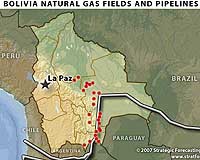 |
Caracas, Venezuela (UPI) Feb 25, 2009 Venezuela's ordinary citizens are dogged by official intolerance of political dissent and worries over personal security because of intimidatory actions carried out on behalf of the government agencies, the Inter-American Commission on Human Rights said. The report from IACHR, an autonomous organ of the Organization of American States, comes at an awkward time for Venezuelan President Hugo Chavez, currently preoccupied with easing politically sensitive shortages of electricity and water in his home country. The scathing criticism of the government's performance no immediate reaction in the Chavez administration, which regards the OAS and IACHR with suspicion because both are based in Washington. At the Cancun, Mexico, summit of some 30 regional leaders this week, Venezuela emerged as a key supporter of a new organization to rival the OAS and serve as a regional bloc bringing together Central and South American countries. The so-called Summit of Unity was marred by sharp verbal exchanges between Chavez and Colombian counterpart Alvaro Uribe, who supports stronger ties with the United States and last year signed agreements to allow U.S. troops use of Colombian bases to fight the war on narcotics. Chavez condemned the Colombian-U.S. agreement and punished skeptics within the Venezuelan society by shutting down independent media and silencing voices of dissent through purges and removal of critics from key positions. The new regional bloc of Latin and Caribbean countries agreed at the summit will exclude the United States and Canada, where criticism of Chavez's style of government has been frequent and explicit. Chavez says the criticism is biased and is designed to engineer his ouster from office. IACHR said in its 319-page report Venezuela made progress in easing illiteracy at the same time as government agencies continued to suppress dissent. "Conditions do not exist for human rights defenders and journalists to be able to freely carry out their work," said IACHR. Among abuses and irregularities the commission's investigators found was frequent punitive action against the media, farmers and trade unionists, participants in civil protests against government actions and policies, the indigenous people and women. Although some progress was made in extending basic services and healthcare to poorer communities, that coincided with suppression of dissent. Social progress cannot be made at the expense of other fundamental rights, said the commission. As a result the commission found that the government's restrictive practices led to the weakening of the rule of law and democracy in Venezuela. The commission findings followed severe restrictions placed on its activities by the Chavez government while its investigators pursued their research.
Share This Article With Planet Earth
Related Links Powering The World in the 21st Century at Energy-Daily.com
 Bolivia oil industry held back by meddling
Bolivia oil industry held back by meddlingLa Paz, Bolivia (UPI) Feb 25, 2009 State meddling is holding back Bolivia's hydrocarbons industry, which showed early promise of growth but more recently has seen production fall, findings published Thursday indicated. Bolivia Oil and Gas Report Q1 2010, published by the Irish Research and Markets, showed that regional oil use in Latin America had gone from 6.93 million barrels a day in 2001 to 7.74 million barrels a day ... read more |
|
| The content herein, unless otherwise known to be public domain, are Copyright 1995-2010 - SpaceDaily. AFP and UPI Wire Stories are copyright Agence France-Presse and United Press International. ESA Portal Reports are copyright European Space Agency. All NASA sourced material is public domain. Additional copyrights may apply in whole or part to other bona fide parties. Advertising does not imply endorsement,agreement or approval of any opinions, statements or information provided by SpaceDaily on any Web page published or hosted by SpaceDaily. Privacy Statement |